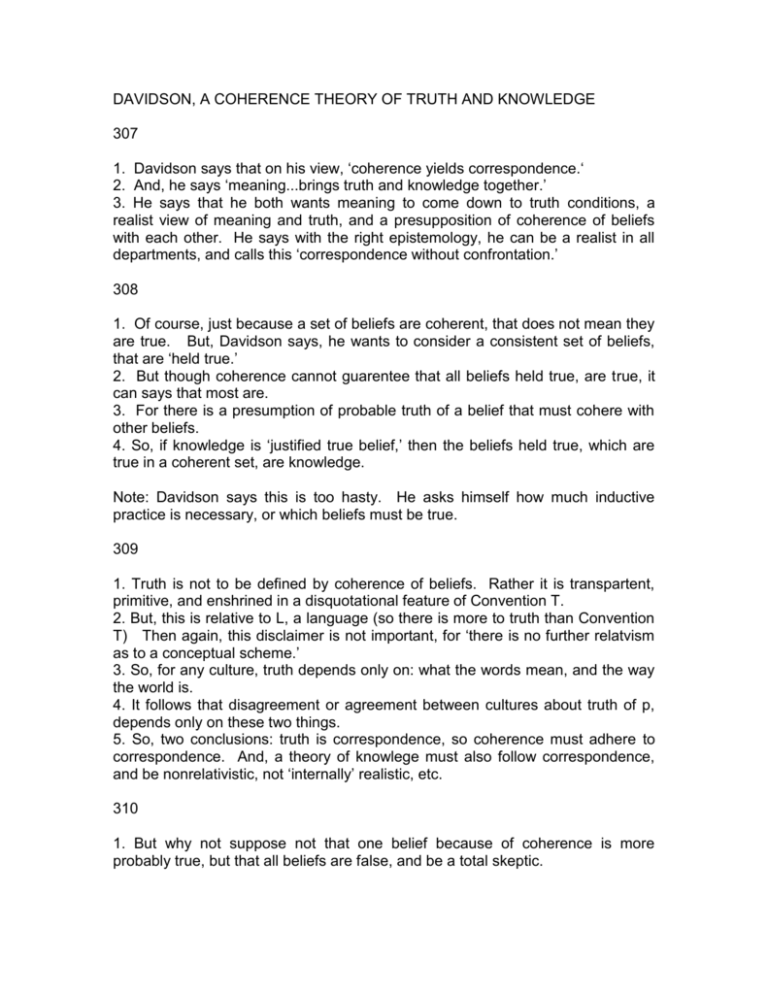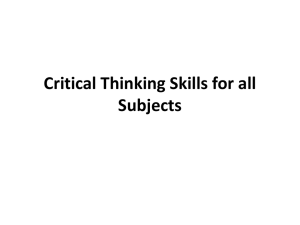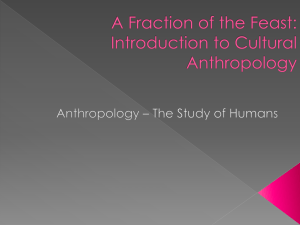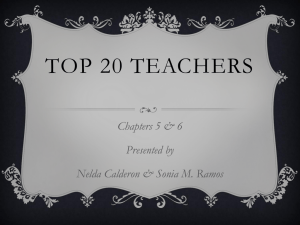davidson, a coherence theory of truth and
advertisement

DAVIDSON, A COHERENCE THEORY OF TRUTH AND KNOWLEDGE 307 1. Davidson says that on his view, ‘coherence yields correspondence.‘ 2. And, he says ‘meaning...brings truth and knowledge together.’ 3. He says that he both wants meaning to come down to truth conditions, a realist view of meaning and truth, and a presupposition of coherence of beliefs with each other. He says with the right epistemology, he can be a realist in all departments, and calls this ‘correspondence without confrontation.’ 308 1. Of course, just because a set of beliefs are coherent, that does not mean they are true. But, Davidson says, he wants to consider a consistent set of beliefs, that are ‘held true.’ 2. But though coherence cannot guarentee that all beliefs held true, are true, it can says that most are. 3. For there is a presumption of probable truth of a belief that must cohere with other beliefs. 4. So, if knowledge is ‘justified true belief,’ then the beliefs held true, which are true in a coherent set, are knowledge. Note: Davidson says this is too hasty. He asks himself how much inductive practice is necessary, or which beliefs must be true. 309 1. Truth is not to be defined by coherence of beliefs. Rather it is transpartent, primitive, and enshrined in a disquotational feature of Convention T. 2. But, this is relative to L, a language (so there is more to truth than Convention T) Then again, this disclaimer is not important, for ‘there is no further relatvism as to a conceptual scheme.’ 3. So, for any culture, truth depends only on: what the words mean, and the way the world is. 4. It follows that disagreement or agreement between cultures about truth of p, depends only on these two things. 5. So, two conclusions: truth is correspondence, so coherence must adhere to correspondence. And, a theory of knowlege must also follow correspondence, and be nonrelativistic, not ‘internally’ realistic, etc. 310 1. But why not suppose not that one belief because of coherence is more probably true, but that all beliefs are false, and be a total skeptic. 2. The coherentist can’t appeal to anything outside of beliefs as a guarentee of truth, so might be stuck here, and think that justification is internal, and so perhaps skepticism would follow. 3. Davidson, says that sure we cannot get ‘outside of our beliefs for justification,’ but he says contra Rorty, we can still talk about the objective world. 4. Now, he says that foundationalist theories (what he calls ‘anti-coherentist’) must show both the relation of sensation ot belief, and says why we should believe in sensation. 5. But, about what sensation causes, basic beliefs, Davidson says, if they do not exeed the content of the sensation, they cannot afford inference to the world, and there are no basic beliefs. Note: Davidson notes, without discussion that one could have a coherentist position that privilages some beliefs for justification. That, I take is, is Wittgenstein’s and my position. This is the idea of basic beliefs having qualities. That is, being unconscious, related to action, undoubtability, withstanding conceptual shifts, and the like. Note: About his foundationalist discussion, there seems no reason for most of his comments. First, there is no reason to believe that basic beliefs need to exeed the content of sensations for inference, no reason to say do not so exeed the content of sensations, and no reason to claim they don’t exist. Davidson seems to hate foundationalism, for some reason. 311 1. Davidson is obviously wrong here, but contingues a bit on his attack. He says that while it is natural to rely on sensation in epistemology because that connects us with the world, in so doing it leads to coherentism and skepticism. 2. Still on the negative, he says the relation between sensation and belief is ‘causal,’ and in this sense are the ‘ground’ or ‘basis’ of those beliefs. But such a ground or basis he notes ‘is not justification.’ 3. He says also the anti-coherentist has trouble answerying the second question: why we should believe in senation at all. 4. He thinks that the anti-coherentist cannot use notions of ‘source,’ ‘information’ and the like, for ‘they apply only to engendered beliefs.’ Note: The charge here is circularity. But, Davidson seems to be making a major mistake. This is: the ‘anti-coherentist’ or foundationalist says sensation is to be believed because it is in contact with the world, and is our source of all information about that world, in a systematic way. Put formally, this is: a. sensation is our only source of information. b. this is systematic c. aberrations lead to harmful falsehoods -- d. sensation keeps us in truthful contact with the world He notes that Quine even, wants to use soch an argument, to ‘assimilate sensation to evidence.’ Davidson, though, critisises such attempts, by saying that our notion of source and notion of information on which such arguments are supposed to rely, are applicable only to belief. He uses them to say that we are not outside our beliefs. That is: a. ‘source’ and ‘intormation’ apply to beliefs only b. but given this, the appeal to sensation is redundant; what is really being appealed to is beliefs c. we are still within our beliefs. -d. sensation justifies nothing But, that is not what is at issue. Rather here, not the notion of such things as source and information, but the source and information themselves fill us up with varied sensations which are true. Our notion of these things comes later, and is irrelivent to the point here. 312 1. Back to the positive. Davidson thinks the problem is that we have been assuming that certain sensations or the totality, have been used in a ‘confrontation’ of sensation and reality. 2. But no such ‘confrontation’ makes sense, because ‘we can’t get outside our skins.’ 3. He says the the use of of sensation is not particularly important; what is important is that any such intermediary which is a cause cannot justificy, for ‘no cause is a justification.’ 4. That is, any such cause may actually be wrong, or even wrong all the time, and so is no guide to knowledge. 5. He says that the moral is that we should allow no ‘epistemic mediaries’ between beliefs and their objects. Note: I worry about two things here. First of all,the no cause is a justification seems to conflice with Davidson’s early work on action theory, where cause and reason are the same. And, he assumes that if a cause as reason is untrue, then it is not a justification. This is such a Draconian version of justification, that it proscribes most any justications. 313 1. Quine and Dummett have in common that ‘meaning can be traced to experience, the given, or patterns of sensory stimulation.’ 2. Quine is verificationist in his way, speaking of ‘patterns of stimulation,’ without talking about sense data and the like. 3. But, the trouble is that Quine’s proposal, like any other such proposal, leads to skeptiism. 4. Still, notes that Quine’s destruction of the analytic synthetic distinction, that there is no distinction between meaning and fact; and indeterminacy of translation, that there are many ways to translate a speaker, are harmless. 5. For ‘what is determinate is all we need.’ 6. Still even given this, Davidson says ‘remember the brain in a vat.’ Note: Of course, in one sense, Davidson is right. For how does one show they are not a such a brain in a vat. But, such a brain in a vat has no problems about induction concerning the world, or other minds, or his life. In fact, no one would much mind if he were such a brain. This sort of skeptiism is benign because all the bad bits about skepticism just mentioned are not parts of it. There is no difference between it and life. 314 1. Davidson says ‘accordingly, I say we give up the idea that meaning or knowledge is grounded in something that is an ultimat e source of evience.’ 2. Meaning and knowledge depend on sensation, but ‘depend’ here is causal, to be confused with evidential justification. 3. What we must show is that someone with a coherent set of beliefs ‘is not mistaken in the main.’ 4. We need ‘a reason to hold that most beliefs are true,’ which is not evidence. 315 1. Now, ‘since beliefs are deeply interlocked, we cannot learn the nature of one, without learning the nature of others.’ 2. Moreover, belief and meaning depend on each other. 3. But in understanding either, we can assume neither one; so we say that both depend on ‘prompted assent.’ 4. This is the causal relation between assenting to a sentence and the cause of that assent. 5. It is possible to know that an agent assents to a sentence without knowing the speaker’s meaning or belief. 6. A speaker cannot always systematically decieve others if he wants to be understood. Thus he ‘holds sentences true.’ 7. It follows, as Davidson says, that in this sense meaning and belief ‘are open to public determination.’ 316 1. The trouble is, how to know what the agent means or believes when all you know is what he assents to, or holds true. 2. The solution Davidson says, will make use of the ‘principle of charity.’ The point of the principle is the ‘make the speaker intelligible.’ 3. Davidson says we have no choice but to read into the speaker both the ‘sentential calculus’ and ‘first order quantification theory.’ That is, logical form, and so our notion of truth. 4. Since too great deviations leave no space in which to judge either conformity or difference. 5. So, Davidson says ‘it makes for mutual understanding...to preserve truth’ when this is possible. 6. It follows that of those sentences agents hold true, they are true, in t he eyes of the interpreter. 6. What is a priori forced on the agent, first of all, are all the truths of logic; and after that, common objects and predicates. These things are all true, as far as the interpreter knows. 317 1. So the epistemological turn around, is that we cannot first identify a belief or meaning, and then ask to justify it. 2. Rather, ‘causality plays an indespensible role.’ In that it determines the content of meaning and belief. 3. The interpreter can be wrong on occasion, but because of charity, this ‘cannot be the rule.’ 4. Davidson says, ‘what stands in the way of global skepticism, on my view, is that in the plainest and methodological cases, we must take the causes of beliefs to be the objects of belief.’ 5. He says ‘communication begins where causes converge.’ 318 1. But how can the agent know if his own beliefs are true? Apart from interpretations, we are all brains in vats. 2. The agent must know what a belief in to doubt it. 3. To do that, is to know that beliefs cohere with others, and such beliefs are ‘generally true.’ 4. That is, they are ‘supported by many other beliefs.’ This support increases the larger the body of beliefs is. 5. It is impossible for large groups of beliefs to be false together. Note: The assumption is, I assume, that many more beliefs have be be false with a big group of beliefs, so unless you assume such falsity, grand falsity, the more beliefs you have, the more truth.




